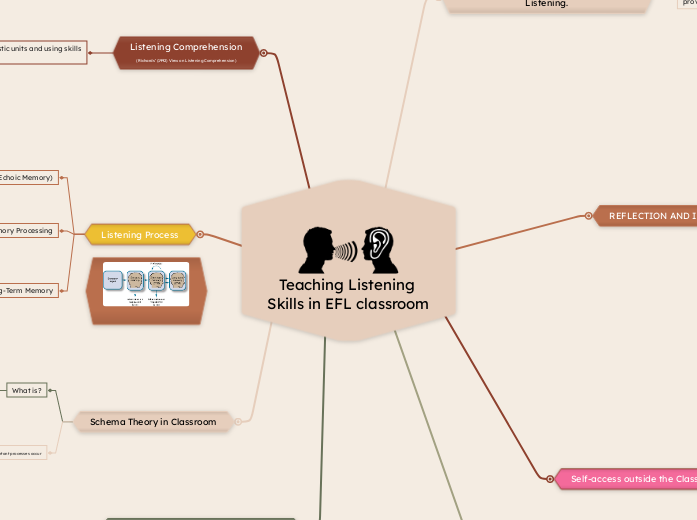Teaching Listening Skills in EFL classroom
Qi (1997) on the Importance of Listening.
Listening is the foundation for learning a language, providing essential comprehensible input.
Comprehensible input: Understandable language that helps build language skills.
Comprehensible input: Understandable language that helps build language skills.
REFLECTION AND IMPROVEMENT
When I was in middle and high school, I had problems, especially with understanding different accents. Most of the input I received came from my teacher and, occasionally, from movies, which were mostly American. I rarely heard different accents, and when I did, I really couldn’t understand them.
I also struggled with several unfamiliar words, as I didn't hear many native speakers and didn’t look for ways to expand my vocabulary. I only learned what was taught in school.
Based on what I learned in this unit, I think some of the things I could have done—and that I might implement in a classroom to prevent students from having similar difficulties—include exposing them to input from different sources, such as movies, videos, and podcasts. Additionally, it would be importante that these materials included various accents, so they don’t get used only to the American accent, which is usually the one we are most exposed to.
Another important point I should implement is to motivate and provide my students with resources so they can continue studying and learning independently, outside the classroom, and in ways and with materials they enjoy.
Self-access outside the Classroom
Encouraging Independent Practice
Learners should be provided with opportunities for students to use diverse audio visual materials as self-access study materials
such as
Tapes
Videos
DVD
Diverse Materials
Listening to English stories, watching conversation shows, films, and even radio broadcasts.
Promotes exposure to English in varied formats and for enjoyment.
What EFL teachers can do to assist learners develop their listening skills
Focus on Meaning
Listening improves when learners concentrate on the meaning and importance of content in English.
Set Comprehension Goals
Define specific objectives for listening activities, allowing learners to assess progress.
Accuracy and Form Analysis
Develop accuracy in perceiving sounds and words.
Listening Comprehension
(Richards’ (1992) View on Listening Comprehension)
Involves recognizing linguistic units and using skills and strategies
Linguistic Units
Phonemes
Words
Grammar
Background Knowledge
Skills
Linguistic Skills: Understanding sounds and words
Cognitive Skills: Processing meaning
Listening Process
Sensory Store (Echoic Memory)
Sounds enter sensory memory and are organized into meaningful units.
Relies on existing language knowledge
Short-Term Memory Processing
Words are matched with known information, meaning is extracted.
Requires comparing new data with stored knowledge in long-term memory.
Long-Term Memory
Constructing meaning and potentially transferring it to long-term memory for future use
Foreign language learners may struggle with all stages due to limited language knowledge
Schema Theory in Classroom
What is?
how knowledge is represented and how that representation facilitates the use of the knowledge.
2 important processes occur
Bottom-Up Processing
The movement of data from the page to the brain
Triggers past knowledge and experiences
Top-Down Processing
Brain attempts to superimpose existing knowledge on new information to assimilate it.
Works alongside bottom-up processing to enhance comprehension.
Listening Difficulties for EFL Learners
Difficulties with sounds, pronunciation, rhythm, intonation, and stress.
Lack of exposure and practice with different kinds of accents and colloquial vocabulary
Inability to skim and predict information due to limited practice.
Inability to link words to the context
Inability to use strategies to summarize heard information
